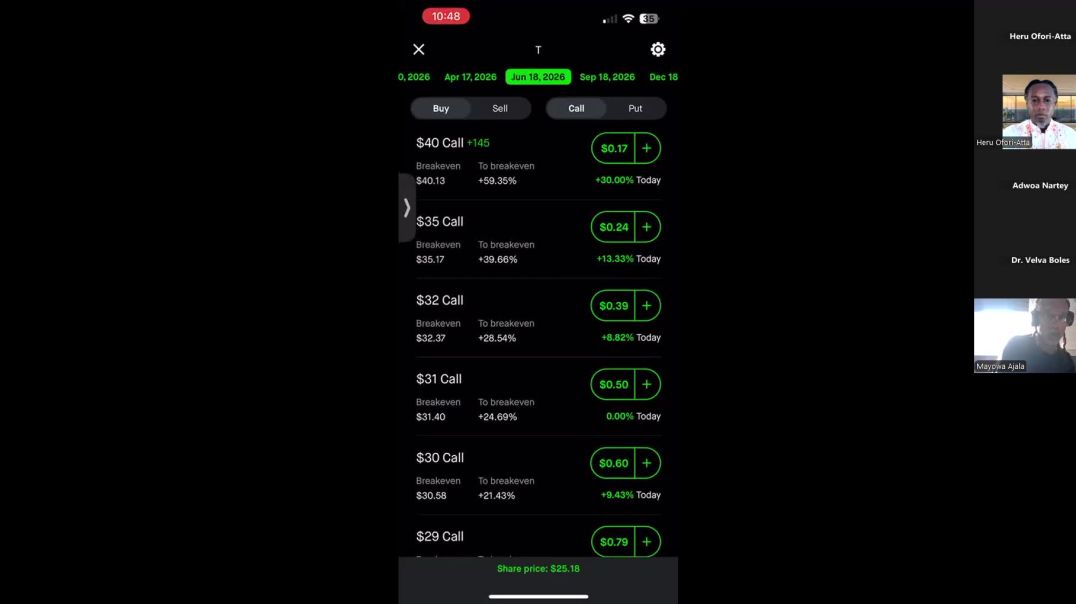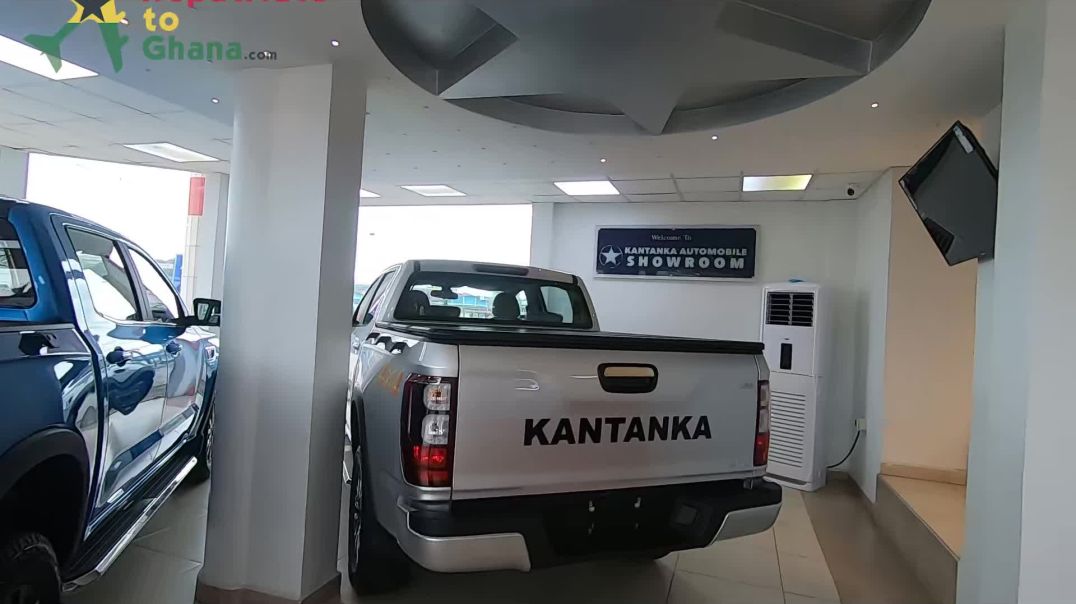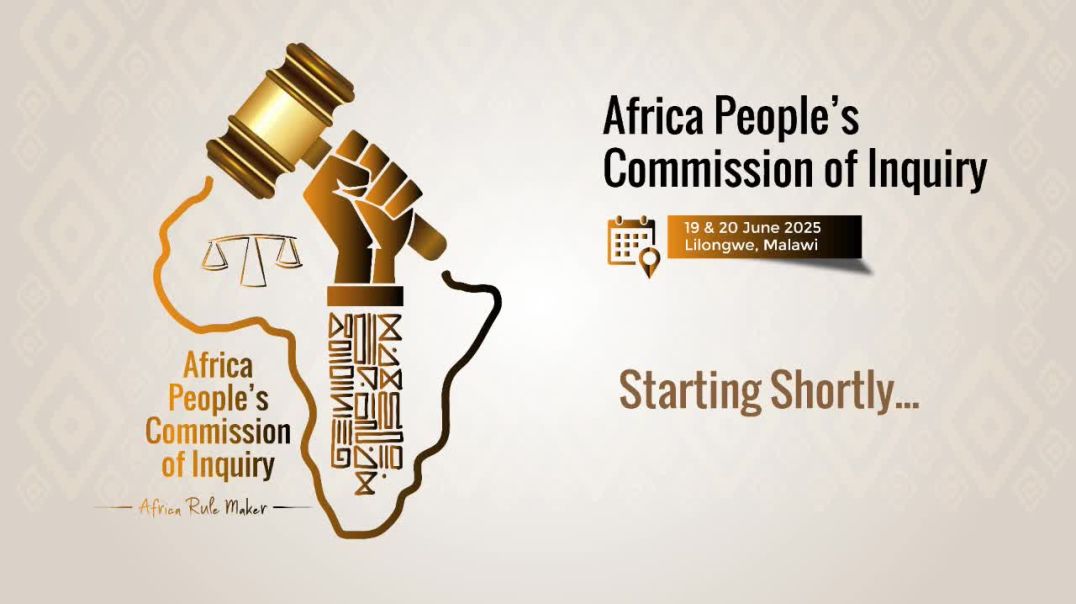Economics
Abibitumi Investments talks with the Ghana Investment Promotion Centre
Sunday 11th January 2026 - 4PM GMT
Reserve your seat now: www.abibitumi.com/investghana/
Heru gives a live session on how he buys stock options. Follow his trades at herutrades.com.
Heru shows people how to seup a stock options trading account. Follow his trades on herutrades.com.
How much does a Kantanka cost? Showroom walkthrough and purchases!
Kantanka Purchases: Mama Kala and Agya Yaw's Car and Truck Purchase Experience
Take the 60-second Repatriation Readiness Quiz & get your custom game plan: https://www.r2gh.com/quiz
We’re at the Kantanka showroom in Achimota locking in two new Kantanka vehicles—an Ɔnantefo (7-seater SUV) for our family and an Ɔmama (4×4 truck) for our brother Aaya (Repatriate to Ghana client). We tour features (👀 six cameras, 360° view, Android-friendly touchscreen, trip recorder/DVR, rotary gear selector, automatic tailgate, fold-flat 3rd row, and a panoramic sun/moon roof) and negotiate a deal directly with the CFO—who came in person for us. This is what Demonstration over Conversation looks like: Kmtyw ‘Black People’ supporting Black industry on the continent—Abibitumi (Black Power) and Abibifahodie (Black Liberation) in action.
—
🚀 Start Your Journey (mid-video reminder)
Skip guesswork. Get matched to your best path back home and into the right community, housing, and transportation: https://www.r2gh.com/quiz
—
Highlights you’ll see
Live showroom walk-through (Achimota HQ)
Ɔnantefo 7-seater: room for the whole squad; fold-flat rear seats for cargo
Ɔmama 4×4 truck: mountain-ready, sturdy, road-tested
Safety & tech: six cameras with top-down view, front cam + removable memory, parking alerts, Android UI
Comfort: power seats, full LED lighting, panoramic roof with shade
Functionality: rotary gear selector, automatic tailgate, configurable seating
Insider access: pricing conversation, options for bank transfer, and timeline
Community: why we buy Black and keep Kanka’s legacy alive
—
Why come through RepatriateToGhana.com?
Because relationships matter. Our long partnership means senior leadership shows up to make things happen. If you’re serious about relocating and want a smoother path to vehicles, housing, paperwork, schools, and community—come through us.
—
Chapters
0:00 Welcome & quick context
0:32 Showroom tour begins
1:45 Why the Ɔnantefo (7 seats, family fit)
3:45 Van in the pipeline (for group travel)
4:14 Inside tech demo (seats, controls, DVR)
6:00 Cargo & seating configurations
8:30 Panoramic roof + infotainment
10:10 Next steps to purchase
11:30 Client feature—Agya Yaw Pereko Ababio (Ɔmama truck)
14:26 Feature demo & negotiation
16:20 Payment options & timeline
20:25 Paperwork details
21:55 Community, legacy, and condolences
24:00 Owner reflections & delivery plans
26:10 How to get your own Kantanka via us
—
In this video
Ɔbenfo (Professor) Ọbádélé Kambon & Mama Kala
Agya Yaw “Corwin Francis” Pereko Ababio(Repatriate to Ghana client)
Kantanka CFO (on-site for deal facilitation)
—
Respect & Legacy
Our hearts go out to the Kantanka family. We honor the legacy—keeping the work moving so our people never have to buy from non-Black industry again.
—
Work with us
Want the same Black-glove support—vehicles, housing, paperwork, schools, community, and more? Start here: https://www.r2gh.com/quiz
—
#abibitumi #abibifahodie #repatriatetoghana #kanka #Ɔnantefo #Ɔmama #blackpower #buyblack #madeinghana #achimota #returnandbuild #Sankɔfa #kmtyw
SUPPORT KIMBUNGA MEDIA: https://www.patreon.com/kimbungamedia
Join WhatsApp: https://whatsapp.com/channel/0....029VaXt3adHwXb8Yt44J
Join Telegram: https://t.me/kimbungamedia
• SUBSCRIBE • LIKE • COMMENT • SHARE
••••••••••••••••••••••••••••••••••••••••••••••••••
Greetings & Welcome to Kimbunga Media - Your Premiere Universal Afrikan Nationalist Media Institution
Find Kimbunga Medai on:
► Instagram: http://instagram.com/kimbungamedia
► https://www.facebook.com/kimbungamedia
► Twitter: https://twitter.com/kimbungamedia
► SignUp for Newsletter: https://kimbungamedia.com/
🎙️ "Viviendo la Realidad de la Negritud en Colombia" 🇨🇴
La verdadera negritud se vive sin privilegios, sin economía y en la periferia. En este clip, abordamos las duras realidades que enfrenta la comunidad negra en Colombia, historias de lucha, identidad y supervivencia. ✊🏿
#negritudencolombia #realidadnegra #mikecrohpone #identidad #luchacultural #concienciasocial #tiktok #instagram #negritud #colombia #identidad #culturaafro #realidadessociales #MúsicaConsciente #privilegio #experienciascotidianas #comunidadafro #vocesnegras
Over half a million people impacted by major data breach — full names, SSNs, financial data and more exposed
As the price of gold exceeds $3,300 per ounce, the Ghanaian government and a multinational gold miner operating in Ghana employ surveillance drones and security teams to confront the growing number of illegal small-scale gold miners in the country.
A commission of inquiry into the policies of the International Monetary Fund and the World Bank that have entrenched Africa’s debt crisis, undermined public services, and driven inequality.
The commission of Inquiry will hear testimonies on how these institutions’ austerity measures and debt-driven models harm African development, with the goal of raising awareness, advocating for debt cancellation, and pushing for reforms that prioritise people over creditors.
Following a wave of coups in Mali, Burkina Faso and Niger, military regimes have entrenched their rule, established the Alliance of Sahel States (AES), withdrawn from the regional bloc ECOWAS, and dismantled mainly Western-led bilateral and multilateral stabilisation mechanisms. These shifts have caused further disruption to an already unstable region plagued by ever-growing jihadist violence and economic hardship. With multilateralism in retreat, bilateral power dynamics are taking on new roles: Russia, Turkey, Iran and increasingly Qatar and the UAE are vying for diplomatic influence and economic footholds in the region.










